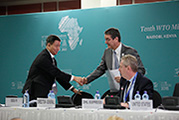MORE:
“There is significant support and funding available from a range of partners to help with trade facilitation measures, and specifically with the implementation of the Trade Facilitation Agreement,” the Director-General said. “This is very positive, and we must keep this momentum … the more extensive and faster the implementation of the Trade Facilitation Agreement, the greater the benefits will be.”
DG Azevêdo spoke at an event on trade facilitation which included the launch of the Global Alliance for Trade Facilitation, a new public-private platform that seeks to use private sector expertise and resources to support trade facilitation reforms. The event took place on the sidelines of the WTO's 10th Ministerial Conference in Nairobi.
Adopted at the WTO's 2013 Ministerial Conference in Bali, the TFA contains provisions for expediting the movement, release and clearance of goods, including goods in transit. It also sets out measures for effective cooperation between customs and other appropriate authorities on trade facilitation and customs compliance issues.
The TFA will enter into force once two-thirds of the WTO's membership has accepted the Agreement. To date, 63 WTO members have ratified the TFA, with six new accessions received in the past few days and others expected shortly.
The benefits of the TFA were highlighted at the event, with several speakers offering concrete examples of how trade facilitation is being implemented and how it has helped companies and national economies.
I.V. Mazorodze, Commissioner of Customs and Excise with the Swaziland Revenue Authority, said efforts undertaken by his government so far on implementation have included the creation of a National Trade Facilitation Committee, the development of a National Trade Portal, training of customs clearing agents, upgrading border infrastructure and the drafting of a new Customs Act.
He noted that Swaziland's ranking in the World Bank's “Doing Business” survey has improved significantly in recent years. The country currently ranks 30th worldwide for the survey's “trading across borders” indicator.
Elizabeth Kimani, General Manager of Nairobi-based Masai Flowers, cited the importance of quick customs clearance for her business. For the busy St. Valentine's Day holiday, hiccups in flower deliveries not only have important economic impacts but, she noted with humour, can also sour relationships.
DG Azevêdo noted the unique architecture of the TFA, which provides developing and least-developed countries with the flexibility to tailor their commitments and implementation schedules according to their specific needs and commensurate with their level of development.
In July 2014, the WTO announced the launch of the Trade Facilitation Agreement Facility (TFAF), which will assist developing and least-developed countries in implementing the TFA. The aim of the Facility is to help WTO developing and least-developed country members find assistance programmes of donor members and organizations and, when assistance cannot be found, to fund project preparation and project implementation.
Selena Jackson, the World Bank's special representative to the WTO, noted that the Bank set up its Trade Facilitation Support Program a year and a half ago to assist governments with TFA implementation, with $36 million in funding. To date, 47 countries have expressed interest in receiving assistance, with implementation programmes launched in 20 countries.
DG Azevêdo stressed the importance of close public-private cooperation in ensuring smooth implementation of the TFA.
“The private sector is well aware of the problems caused by high costs and long delays at the border — and the barriers to trade that they represent,” he said. “These barriers can often mean the difference between being able to compete internationally — or not.”
The Director-General said the launch of the Global Alliance “is a very important moment for the WTO, and for the entire trade facilitation community.” He thanked the World Economic Forum, the International Chamber of Commerce, the Center for International Private Enterprise, and donor countries for supporting the initiative. His full speech is available here.
The Gl Alliance is supported by contributions of Canada, Germany, the United Kingdom and the United States. Furthermore, Australia is expected to join soon. A number of multinational companies have also pledged support, including A.P. Møller-Mærsk, DHL and Wal-Mart.
United States Trade Representative Michael Froman said implementation of the TFA can help promote export diversification, attract investment, improve revenue collection and support the engagement of small and medium-sized enterprises (SMEs) in the global economy.
“From our own perspective, we know that SMEs are really the driving force of the economy, they're the job creators,” Mr Froman said. “When we ask our SMEs what are the biggest challenges facing them when they engage in international trade, the number one issue they point to are the complexities at the border, the various customs procedures and border measures. The TFA is very much an effort to address that.”
Lord Francis Maude, the United Kingdom's Minister of State for Trade and Investment, noted that the TFA would produce “real benefits” for all WTO members, but for developing countries in particular.
“At present, one standard container from Sub-Saharan Africa will take 31 days on average and cost nearly $2000 to ship,” he said. “To do the same from East Asia is ten days less and half the cost.”
The reforms required by the TFA are “hard,” Lord Maude admitted. “It's tackling inertia, it's tackling vested interests who are used to things being done in a particular way.”
More information on trade facilitation and the TFA can be found at www.wto.org/tradefacilitation.
> Problems viewing this page?
Please contact [email protected] giving details of the operating system and web browser you are using.

